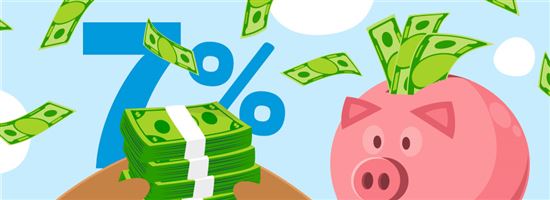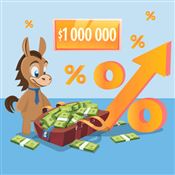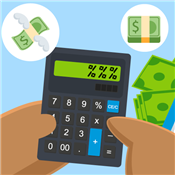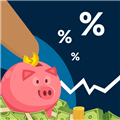Best 7% High-Yield Savings Accounts for May 2024
Ad Disclosure: This article contains references to products from our partners. We may receive compensation if you apply or shop through links in our content. This compensation may impact how and where products appear on this site. You help support CreditDonkey by using our links.
Do savings accounts with 7% interest actually exist? Read on to find out.
 |
Are There Savings Accounts with 7% Interest?
Most banks today do not offer 7% APY on savings accounts. But there are still many good options that can boost your savings with attractive returns on your money.
How Much Do You Earn With A 7% Savings Account?
$10,000 in a 7% APY savings account will earn $700 a year. Use this calculator to see how much your money can grow:
Here's a table of how much you would have with 7% interest and different monthly contributions.
| Monthly Contribution | 1 year | 3 years | 5 years |
|---|---|---|---|
| $1,000 Initial Deposit | |||
| $0 | $1,070 | $1,225 | $1,403 |
| $100 | $2,270 | $5,083 | $8,303 |
| $300 | $4,670 | $12,799 | $22,105 |
| $500 | $7,070 | $20,514 | $35,907 |
| $1,000 | $13,070 | $39,804 | $70,411 |
| $5,000 Initial Deposit | |||
| $0 | $5,350 | $6,125 | $7,013 |
| $100 | $6,550 | $9,983 | $13,914 |
| $300 | $8,950 | $17,699 | $27,715 |
| $500 | $11,350 | $25,415 | $41,517 |
| $1,000 | $17,350 | $44,704 | $76,022 |
| $10,000 Initial Deposit | |||
| $0 | $10,700 | $12,250 | $14,026 |
| $100 | $11,900 | $16,108 | $20,926 |
| $300 | $14,300 | $23,824 | $34,728 |
| $500 | $16,700 | $31,540 | $48,530 |
| $1,000 | $22,700 | $50,829 | $83,034 |
| $20,000 Initial Deposit | |||
| $0 | $21,400 | $24,501 | $28,051 |
| $100 | $22,600 | $28,359 | $34,952 |
| $300 | $25,000 | $36,075 | $48,754 |
| $500 | $27,400 | $43,790 | $62,556 |
| $1,000 | $33,400 | $63,080 | $97,060 |
Can You Lose Money In A 7% Savings Account
The risk of losing money with any high-yield savings account is very low. As long as the bank or credit union is covered by the FDIC or NCUA, your money is safe.
This is because the federal government insures your deposits up to $250,000 per depositor, per ownership category at each financial institution.
That said, you can lose money if you fail to meet minimum balance requirements. In that case, you may be charged a monthly fee.
Yes, interest earned on 7% savings accounts is taxed. The IRS sees it as taxable income, whether you leave it in your account or take it out. If you earn more than $10 in interest, you'll need to fill out a tax form and report it. [1]
Pros and Cons of A 7% APY Savings Account
Here are the pros and cons of a 7% interest rate savings account:
Pros
- Grow your money faster
- Your money is easily accessible
- Savings are FDIC-insured up to $250,000
Cons
- APY can change at anytime
- Limited availability
- Potential fees and restrictions
- Potential deposit/balance requirements
How to Open a 7% APY Savings Account
If you find a bank or credit union offering a rare 7% interest rate and want to open an account, here's how the online process typically goes:
- Go to the website of your chosen bank or credit union and select the savings account offering a 7% interest rate.
- Fill out the application form with your personal information such as your legal name, date of birth, a valid government-issued ID, SSN, etc.
- Submit the application and fund your account.
Additionally, for credit unions, you need to meet membership requirements first before you can open an account.
The EARN rule helps you remember the key aspects to consider when looking for a high-interest savings account:
- Earnings: Prioritize accounts that offer high interest rates.
- Accessibility: Ensure you can easily access your money when needed.
- Reliability: Choose a bank with a solid reputation and good customer reviews.
- No hidden fees: Avoid accounts with hidden fees that could diminish your savings.
How To Choose A 7% Interest Savings Account?
There are numerous high-yield savings accounts being offered today. Here are some things to consider to find the best one for you:
Good APY
Opening an account that allows you to earn a good APY is the most crucial factor you need to consider. Check out different banks and credit unions to find the best option for you.
However, don't just look at the highest rates offered because some may have restrictions that are not worth it.
Fees
Some banks may have monthly fees if you don't maintain a certain balance. If so, make sure it makes sense for you.
Account Requirements
Some banks only give you the highest APY if you keep a certain balance (or conversely, only up to a certain amount). There could be other requirements to get the high rate too. These conditions could be restrictive.
Is a 7% Savings Account Worth It?
7% interest savings accounts are hard to find. And if there is one, they often have requirements and limitations that may not be worth the trouble.
Therefore, you are better off putting your money in an account with a slightly lower APY but with minimal fees and restrictions.
Finding a savings account with an interest rate higher than 7% is unlikely right now. Additionally, even banks that offer a 7% interest rate on savings accounts are rare to come across today.
- CIT Bank Platinum Savings:
3.75% APY - UFB Portfolio Savings:
Earn up to 3.26% APY - Western Alliance Bank:
High-Yield Savings Premier - 3.80% APY - Mission Valley Bank:
High Yield Savings Account - 3.86% APY - Axos ONE:
Earn up to 4.21% APY - Quontic:
High Yield Savings - 3.50% APY - Valley National Bank:
High-Yield Savings Account - 3.90% APY - Live Oak Bank:
Personal Savings - Earn 3.80% APY - Raisin:
High-Yield Savings Account - Up to $1,500 Bonus - Current Savings:
Up to 4.00% bonus
- Western Alliance Bank:
High-Yield CD Rates - Up to 4.00% APY - CIT Bank No Penalty CD:
3.75% APY - Quontic:
6 Month CD - 3.75% APY - Sallie Mae Bank:
10-Month No Penalty CD - 3.00% APY - Mission Valley Bank CD Rates:
Up to 3.80% APY
Alternatives To 7% Savings Accounts
Since savings accounts with 7% interest are rare, here are some alternatives you can check out.
Certificate of Deposit
If you prefer earning a fixed rate, getting a CD account may be the better option for you. Your rate will stay the same even if market conditions change.
Just remember that your money will be locked up for a specific period and you can only withdraw it upon maturity.
Right now, you won't find any financial institution in the US offering CDs with a 7% interest rate. If there were any in the past, they were most likely temporary promotions available for a short time only.
- Western Alliance Bank:
High-Yield CD Rates - Up to 4.00% APY - CIT Bank No Penalty CD:
3.75% APY - Quontic:
CD Rates - Up to 3.75% APY - Raisin:
High-Yield CD - Up to $1,500 Bonus - Sallie Mae Bank:
10-Month No Penalty CD - 3.00% APY - Mission Valley Bank CD Rates:
Up to 3.80% APY
Money Market Account
A money market account typically offers a competitive interest rate and may allow convenient access to your funds through electronic transfers, debit cards, and checks. But, keep in mind that some banks may have initial deposit or balance requirements that you need to meet.
- UFB Portfolio Money Market:
Earn up to 3.26% APY - Ally Bank:
Money Market - 3.30% APY - Quontic:
Money Market Account - 4.00% APY - EverBank Performance℠ Money Market:
Up to 3.80% APY - Prime Alliance Bank:
Personal Money Market Account - 3.75% APY - Affinity Plus Credit Union:
Superior Money Market - Up to 3.40% APY - Vio Bank:
Money Market Savings Account - 4.31% APY - Sallie Mae Bank:
Money Market Account - 3.65% APY
High-Yield Checking
A high-yield checking account allows you to earn interest on the money in your checking account. It's a great option for people who want to earn a good interest rate while still being able to access their funds easily with a debit or ATM card.
Bonds
If you want to go beyond banking products, you can check out bonds for another (relatively) low-risk way to earn more money.
You can get good rates, regular interest payments, and decent liquidity when you invest in bonds.
Stocks, Forex, & Cryptocurrencies
If you don't mind the extra risk for higher rewards, trading stocks and currencies is a popular option. However, returns are not guaranteed and you could lose money too.
Bottom Line
A 7% interest savings account may seem appealing in hindsight but the conditions of opening one are often not worth it.
Even though the rates offered by most banks today are lower, you are more likely to grow your funds with them.
Keep in mind that savings account rates are variable so things will be different years, months, and even weeks from now. You can keep yourself in the loop by keeping an eye out on our page for the latest rates!
References
- ^ IRS. Topic no. 403, Interest received, Retrieved 04/26/2024
Darlene Santos is a research analyst at CreditDonkey, a bank comparison and reviews website. Write to Darlene Santos at darlene.santos@creditdonkey.com. Follow us on Twitter and Facebook for our latest posts.
Note: This website is made possible through financial relationships with some of the products and services mentioned on this site. We may receive compensation if you shop through links in our content. You do not have to use our links, but you help support CreditDonkey if you do.
|
|
|




